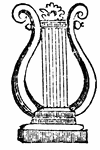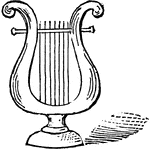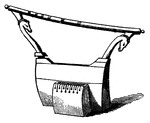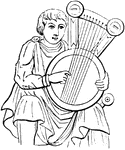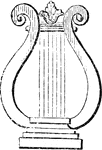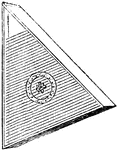Ancient Greek Musical Instruments
Ancient Greek Musical Instruments ClipArt gallery offers 32 illustrations of the auletris, chelys, cithara, crotalum, pan pipes, lyre, keras, and other musical instruments of Ancient Greece.

Auletris
"Auletris.- Performer on the double flute or diaulos. (From a Greek red-figured vase; 5th century B.C.)"-Whitney,…

Chelys
"Chelys, from a vase in the British Museum, where also are fragments of such an instrument, the back…

Cithara
A seven-stringed lyre with a deep, wooden sounding box. Primarily used by the ancient Greeks, this instrument…
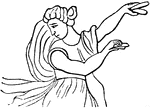
Crotalum
"A kind of cymbal. It appears to have been a split reed or cane, which clattered when shaken with the…
Double Pipes
"Ancient Greek Double Pipes. Elgin Collection, British Museum." — The Encyclopedia Britannica,…

Ancient Grecian Female with Double Flute
Grecian female with double flute dressed for funeral procession.

Lyra
"A lyre, one of the most ancient musical instruments of the stringed kind. The Greeks attributed the…

Lyre
A stringed musical instrument well known for its use in Classical Antiquity. The recitations of the…
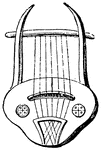
Lyre
A stringed instrument well known for its use in Classical Antiquity. It was used mainly by the Ancient…
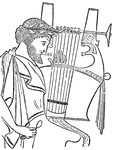
Lyre
"Cithara or Phorminx, from a vase in the British Museum. Best period of Greek art." —The Encyclopedia…
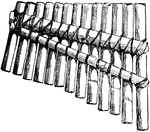
Pan Pipes
A primative musical instrument consisting of a graduated series of tubes of cane, wood, metal, or stone,…

Pan Pipes
A primative musical instrument consisting of a graduated series of tubes of cane, wood, metal, or stone,…

Pan's pipes
Also known as the syrinex is the earliest example of a graduated series of open-pipes, with a very obvious…

Syrinx
"Syrinx, the Pan's pipe, or Pandean pipe, was the appropriate musical instrument of the Arcadian and…
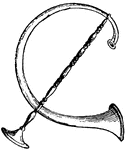
Syrinx
An ancient musical instrument based on the principle of the stopped pipe, consisting usually of ten…

Water Organ
The water organ or hydraulic organ (early types are sometimes called hydraulis, hydraulos, hydraulus…




